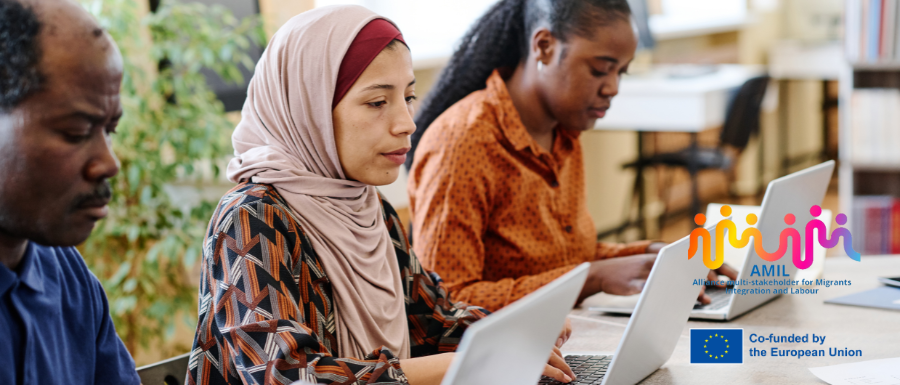The AMIL Project (Alliance Multi-Stakeholder for Migrants Integration and Labor) is a strategically significant initiative designed to promote the sustainable integration of Third-Country Nationals (TCNs) into the labor market. Among its standout features are the Pilot Actions, which employ an integrated and multidimensional approach to enhance professional opportunities and economic inclusion for TCNs using innovative methodologies and targeted interventions.
Recruitment and activation of beneficiaries
The initial phase includes extensive awareness-raising and outreach activities targeting potential beneficiaries, supported by a comprehensive communication strategy. Tools such as dedicated websites, social media platforms, and informational materials distributed at reception centers and diaspora communities ensure widespread coverage. Municipalities play a strategic role in facilitating beneficiaries’ access to project services.
The selection process is rigorous, beginning with CV collection and analysis, followed by individual interviews and orientation seminars. This ensures an adequate number of participants in each involved country.
Skills Assessment and Training Needs Analysis
Once selected, candidates undergo a thorough assessment of their skills and a focused analysis of their training needs. This process considers competencies acquired in informal and non-formal contexts, identifying gaps and contributing to the co-definition of tailored professional profiles. The EU Skills Profile Tool for Third-Country Nationals is used to map skills, qualifications, and work experience. Individual and group assessments encourage a participatory approach, fostering active engagement and self-evaluation.
Personalised Intervention Plans (PIPs)
Following the skills assessment, Personalized Intervention Plans (PIPs) are developed for each beneficiary. These plans, created by experts in collaboration with local partners, outline targeted strategies to improve access to resources and effectively support employment pathways. PIPs define shared goals among all stakeholders, promoting an integrated and multifocal approach that maximises outcomes and ensures beneficiary involvement.
Professional Skills Workshops
The workshops are tailored to beneficiaries’ backgrounds and the specific needs of the labor market. These programs, offered both online and in-person, cover various sectors, including hospitality, construction, logistics, and the green economy. Participants begin with an overview of market trends, labor regulations, and safety standards, followed by sector-specific training. Accredited training programs ensure that beneficiaries acquire relevant and in-demand skills, preparing them for effective labor market integration.
Professional and Specialised Language Training
Beneficiaries have the opportunity to complement their professional training with intensive language courses aimed at improving linguistic skills, particularly for roles such as intercultural mediators. The proposed training model will be shared and regularly updated at the European level, ensuring uniform standards and high-quality training across participating regions.
Workshops for Soft Skills Development
Soft skills are crucial for effective integration into the labor market. These workshops address key aspects such as cultural decoding, skill identification and evaluation, and strengthening of areas identified as needing improvement. Innovative tools like sports, art, and digital storytelling are used to develop these skills, which are often culturally complex yet essential for adapting to new socio-professional contexts.
Coaching and Mentoring Processes
Coaching and mentoring programs provide continuous support and monitoring. Beneficiaries participate in individual and group workshops to update CVs, prepare for job searches, and receive advice on work-based learning programs like internships and job shadowing. Coaches and mentors guide participants throughout the process, ensuring they are well-prepared for the labor market.
A Holistic Approach to Integration
Through its comprehensive Pilot Actions, the AMIL Project adopts a holistic approach to migrant integration. From selection and skill assessment to personalised planning and targeted training, the initiative aims to significantly enhance the employability and economic inclusion of TCNs. This approach not only delivers direct benefits to individual participants but also contributes to building a more inclusive, cohesive, and integrated society.
The AMIL Project – Alliance Multi-Stakeholders for Migrants Integration and Labor – is funded by the Asylum, Migration, and Integration Fund (GA Project No. 101140939) – follow us to stay updated on the latest developments and outcomes of the AMIL Project! For more details on ongoing activities, stay tuned for the project’s official newsletter: in the meantime, sign up to join the AMIL project’s Community of Interest at this link.
